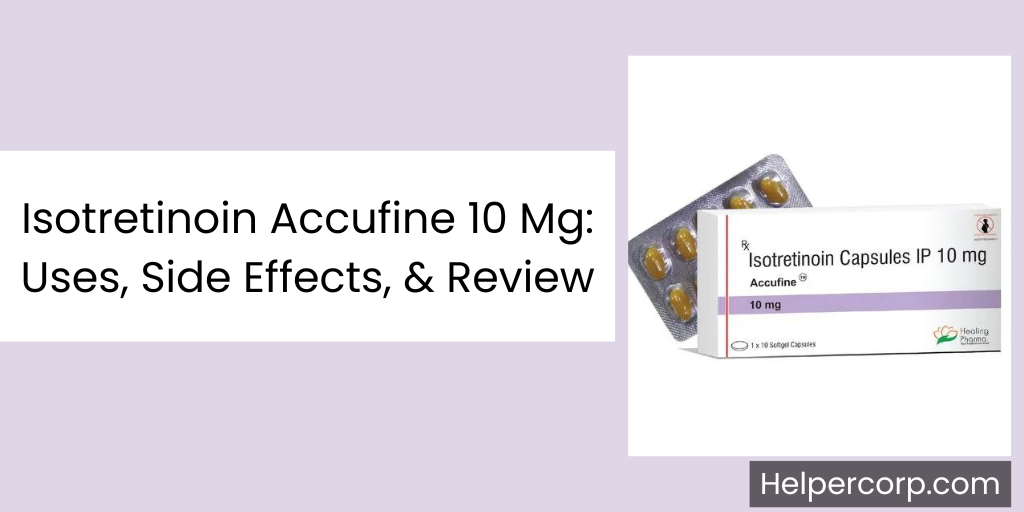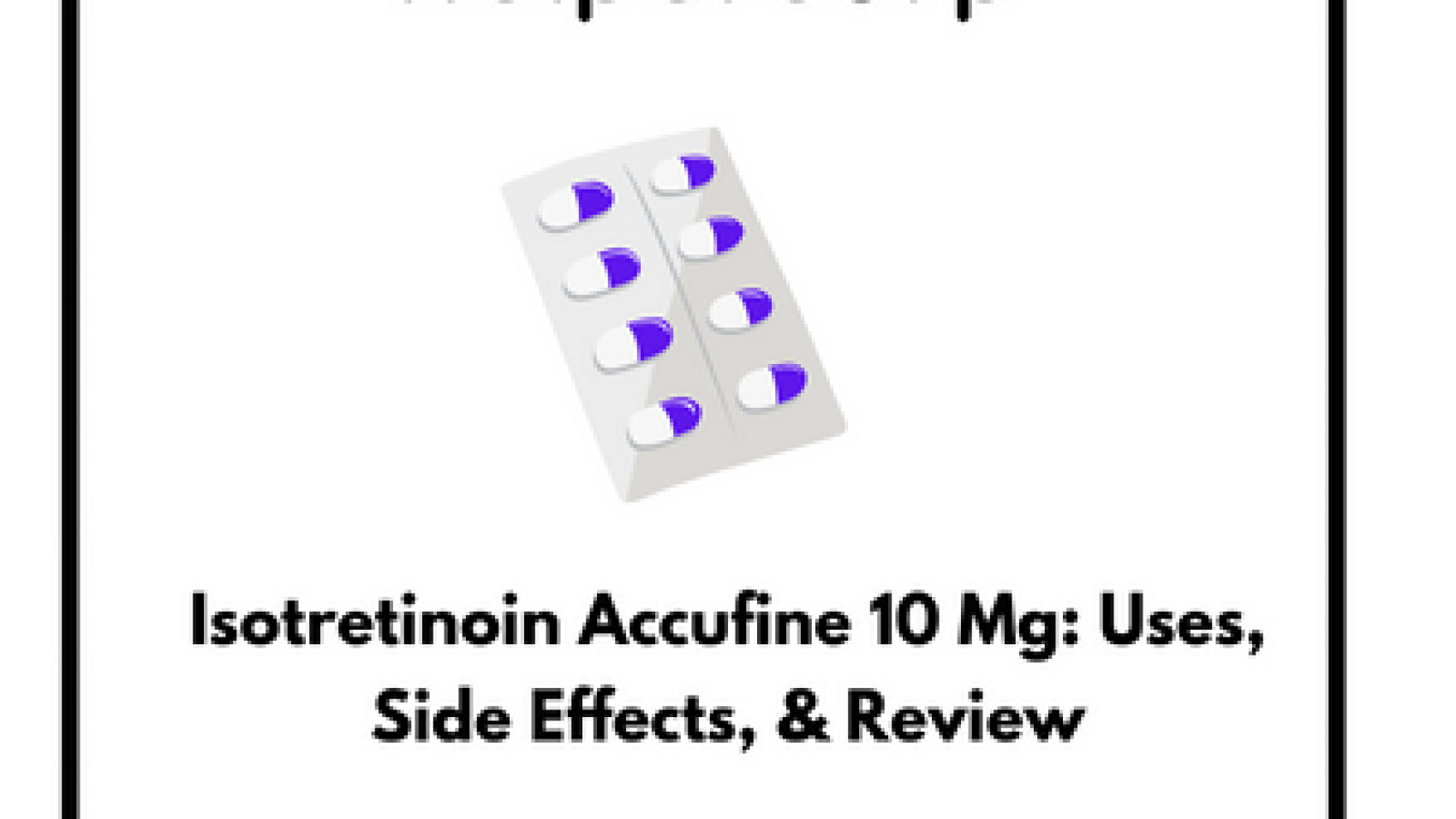

Isotretinoin Accufine 10 Mg
| Active Ingredient (Generic Name): | Isotretinoin |
|---|---|
| Indication: | Treat Severe Acne |
| Manufacturer: | Healing Pharma India Pvt Ltd |
| Packaging: | 10 Tablets in a strip |
| Strength: | 10 mg |
| Delivery Time: | 6 To 15 days |
Isotretinoin Accufine 10 mg is a drug closely linked to vitamin A cognate and a member of the retinoid family of drugs. It treats severe acne that has not responded to previous therapies.
Accufine treats nodular acne, which manifests as a large, painful hard bump or severe cystic acne. The excellent efficacy response of this Accufine is renowned for treating various acne problems.
Table of Contents
- Isotretinoin Accufine 10 Mg
- About Isotretinoin Accufine 10 Mg:
- Isotretinoin Accufine 10 Mg Uses:
- How does Isotretinoin Accufine 10 Mg works?
- Isotretinoin Accufine Accufine 10 Mg Dosage:
- Isotretinoin Accufine 10 Mg – Missed Dose:
- Accufine 10 Mg- Overdose:
- Accufine 10 Mg – Warnings:
- Isotretinoin Accufine 10 Mg Side Effects:
- Isotretinoin Accufine 10 Mg – FAQs
About Isotretinoin Accufine 10 Mg:
Accufine, which contains Isotretinoin, treats severe cystic acne, nodular acne, and other severe skin conditions. It belongs to the class of medications known as retinoids. Accufine medications reduce the quantity of sebum (facial oil), which is what causes this severe acne to appear. Since Isotretinoin is derived from vitamin A, consumers should be advised to avoid using any other vitamin A supplements to prevent any potentially fatal severe adverse effects. Additionally, if acne is not treated, it might cause serious harm.
Isotretinoin Accufine 10 Mg Uses:
Isotretinoin Accufine is used for a variety of purposes, including:
• The chemical makeup of skin fat discharge is minimized and improved by this medicine.
• It eliminates the signs and symptoms of bleeding or expanding skin lesions.
• Represses but does not completely cease sebaceous gland activity.
• This medication must be used if the acne’s inflammatory lesions are 5mm in diameter or larger.
• Recalcitrant, cystic, and other severe types of acne are treated with this medication (nodular).
The recommended oral dosage for this medication is 1 mg/kg daily. And during the whole course of therapy, it should be consistently followed.
• Accufine pill therapy is recommended for an average of 4.4 months. As a result, the medication must be taken every 12 hours.
Get advice on how to take this medicine from your doctor or pharmacist before using it.
• Swallow the pill whole, without cutting it in half, with a glass of water.
• The most generic version of this medication’s instructions states that it should be taken with food.
• After taking the medication, wait 10 minutes before lying down or relaxing.
• Pregnant or soon-to-be pregnant women should take special care to avoid breathing in the dust from the capsules. Do not administer or handle this medicine since it poses a risk to your infant.
• The makers of this medication do not advise using Isotretinoin for an extended time. Do not increase your dose strength over what is advised.
Also Read: Hydroxychloroquine HCQS 200 Mg: Uses, Side Effects, & Review
How does Isotretinoin Accufine 10 Mg works?
In response, Isotretinoin compresses the skin’s oil glands or sebaceous glands. Your skin’s production of oil is decreased. When the skin is not producing too much oil, it is not hanging around, plugging pores, and starting breakouts. By reducing skin oil production, acne may be managed.
During the first few days after using this medication, you can notice that your acne is becoming worse. After using this prescription for one or two months, the outcomes and benefits will become apparent. So, after two months without taking the drugs, a second treatment session may be started if you see your severe acne returning.
Vitamin A, an active component of Accufine, may regulate skin sebum production. When used to treat severe acne issues, this medication’s response causes an uprising. Therefore, Isotretinoin medications provide genuine hope for patients who have tried various acne treatments without success. When used as directed with the utmost care and on the advice of a dermatologist, Isotretinoin is regarded as a reactive and potent medication with very detrimental aesthetic components.
Isotretinoin Accufine Accufine 10 Mg Dosage:
The primary purpose of Accufine Isotretinoin 10 Mg Dosage is to treat acne that is accompanied by severe clinical manifestations. In addition, several other retinoids are utilized solely as decorticates and anti-aging proxies in cosmetics. Drugs containing Isotretinoin are extremely effective in more than 90% of instances because they lessen inflammatory skin lesions. In other words, isotretinoin medications impact keratinocytes’ ultimate disparity. Additionally, normalizes the skin’s redox and revival processes.
When used by pregnant ladies, this Accufine Isotretinoin medication will be risky to consume. This anti-acne substitute is seen negatively since retinoids may damage an unborn child and result in severe problems. Correct laboratory tests must be performed on these medicine users to check for any special warnings, such as pregnancy, blood counts, blood cholesterol, etc. Before taking a dose, these users must carefully watch any negative effects.
Isotretinoin Accufine 10 Mg – Missed Dose:
If a patient misses a medication dosage because they forget to take it at the appointed time, they may take it as long as six hours between that dose and the following one. The user must continue with the precise advised dosage schedule if more than 6 hours have elapsed after the last dose. To make up for missed doses, avoid bingeing.
Accufine 10 Mg- Overdose:
If a user believes they have overdosed and notices any serious side effects, such as losing consciousness or having trouble breathing, they should dial 911 right once. Vomiting, stomach discomfort, face flushing, headaches, and loss of balance are the overdose symptoms that may occur. If an emergency arises, phone the temporary poison center right once.
Accufine 10 Mg – Warnings:
The following are some cautions before using Isotretinoin:
• If the user is taking drugs containing vitamin A or has an allergy to them, please inform your specialist doctor or pharmacist immediately.
• This product could also include inactive components, including soybeans, which might exacerbate any subsequent allergy responses.
• Tell your doctor or pharmacist about your current and past medical conditions. It is required if you have diabetes or a family history of high blood fats, mental illness, unpredictable mood swings, obesity, alcohol misuse, illnesses that cause bone loss, or eating disorders.
• If you are currently using Isotretinoin, you must wait at least one month after stopping the medication before you may give blood.
• Refrain from exposing yourself to the sun. Spend as little time as possible sunbathing. Wear clothing that protects you from the sun and the heat when outside. You should see a doctor immediately if you are burnt or your skin becomes red.
• Isotretinoin may impair your ability to see at night.
• Driving or going outside while your vision is foggy is risky.
• It may be challenging for the patient to tolerate contact lenses if they currently use them while taking this medicine. Call your doctor for further details.
• Avoid using cosmetic procedures to lighten your skin throughout the six months while receiving this isotretinoin medication. If you do this, skin scarring might happen.
Isotretinoin Accufine 10 Mg Side Effects:
The following are some of the negative effects of isotretinoin Accufine medications:
• Other possible side effects include thinning hair, swollen eyelids or lips, bleeding from the nose, nausea, and stomach aches. If any of these symptoms appear, call your doctor right once.
• Immediately notify your doctor if you have any of these adverse effects, which include mental confusion, erratic mood swings, skin itching, signs of infection, aching joints and muscles, and discomfort while swallowing.
• Palm skin that is peeling.
• Uncertain fever and a recurring sore throat are possible.
• Pancreatitis, a condition that may have disastrous effects on your health, can sometimes be impacted by and caused by Isotretinoin. Stop taking the drug and call your doctor immediately if you have extreme nausea or vomiting.
• Some serious symptoms need you to inform your doctor immediately. Headache and blurry vision. Chest discomfort, dark pee, severe diarrhea, intestinal bleeding, skin and eye yellowing, and hearing loss.
• Chapped lips, dry skin, dry eyes, and a dry nose that bleeds are some of the additional serious side effects. During Accufine therapy, patients must be frequently seen and counseled by the physician.
Accufine, which contains the drug isotretinoin, is often used to treat severe nodular or cystic acne. This medication successfully heals acne, but it also has some dangers. Additionally, it is essential to identify the correct causes of severe acne. There are several causes, including stress and hormone imbalance. And carry out the directions that your physician or pharmacist gave you.
It is vital to let your doctor know about your past medical history since this prescription may interact with certain other drugs. The drug has to be kept out of reach of children and animals. Avoid heat and wetness as well.
Also Read: Fildena 150 Mg: Uses, Side Effects, Dosage, & Honest Review
Isotretinoin Accufine 10 Mg – FAQs
Can you take Accufine (Isotretinoin) every day?
Before beginning to use Isotretinoin Accufine, consult a medical professional. The most often advised Accufine dosage strength is 0.5 to 1 mg daily, taken in two evenly spaced doses with a meal, for 15 to 20 weeks. It is not advised to take the dose every day.
Research comparing doses of 0.5, 0.1, and 1 mg per day found that all amounts start the illness from progressing. However, the necessity for retreatment still exists with lesser amounts of treatment. Based on the clinical side effects indicators, the dose strength may be changed over the course of therapy.
How long until isotretinoin Accufine starts to work?
Sebaceous gland obstruction is the cause of acne. It is produced by tiny glands and sent via a specific duct or channel. Inflammation results from sebum formation in the gland when the track is obstructed.
Isotretinoin generally demonstrates its efficacy by influencing all major paths in the development of acne. Consuming these medications causes a decrease in sebum production, which prevents the development of blackheads and, in turn, lessens the response of the propionic bacteria.
Disclaimer: The information shared above about the medicine is only for knowledge purposes people are advised to use the medicine exactly as per doctor or personal health assistance guidelines.
This drug aids in reducing the severity of acne outbreaks. After the isotretinoin treatment time, the generally normal sebum compound is resumed. Naturally, the size of the sebaceous glands gradually increases with time, but they seldom reach the level of significance they had during the first course of isotretinoin therapy.

